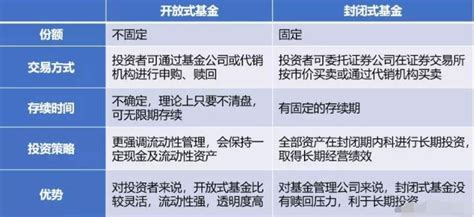怎么查看封闭期的基金涨多少
Title: Understanding ClosedEnd Fund Shares
Understanding ClosedEnd Fund Shares
Closedend funds (CEFs) are investment funds that raise a fixed amount of capital through an initial public offering (IPO) and then trade like stocks on a secondary market. Investors can buy and sell shares of closedend funds on stock exchanges throughout the trading day. However, unlike openend mutual funds, closedend funds have a fixed number of shares outstanding, which are not redeemable from the fund itself.

- Fixed Number of Shares: Closedend funds issue a fixed number of shares through an IPO. Once these shares are issued, the fund does not issue or redeem additional shares.
- Market Price: Unlike openend funds, the price of closedend fund shares is determined by supply and demand in the market rather than the net asset value (NAV) of the underlying securities.
- Discount or Premium: Closedend funds can trade at a price that is either higher (premium) or lower (discount) than their net asset value per share.
- Income Distribution: Many closedend funds distribute regular income in the form of dividends or interest payments to shareholders.
- Active Management: Some closedend funds are actively managed, meaning portfolio managers actively buy and sell securities to achieve the fund's investment objectives.
When considering investing in closedend fund shares, investors should assess several key factors:
Investing in closedend funds requires careful consideration of various factors, and it's essential to conduct thorough research before making investment decisions. Here are some guidance tips for investors:
- Diversification: Consider incorporating closedend funds into a diversified investment portfolio to mitigate risk and enhance returns.
- LongTerm Perspective: Approach closedend fund investments with a longterm perspective, as shortterm market fluctuations may impact share prices.
- Monitor Discounts and Premiums: Keep track of discounts and premiums to identify buying opportunities or potential risks associated with market sentiment.
- Consult Financial Professionals: Seek advice from financial advisors or investment professionals who can provide personalized recommendations based on your financial situation and objectives.
免责声明:本网站部分内容由用户上传,若侵犯您权益,请联系我们,谢谢!联系QQ:2760375052









